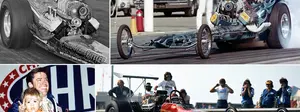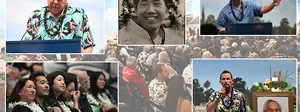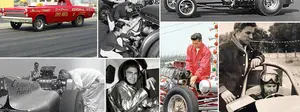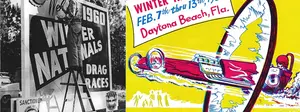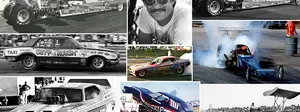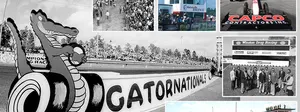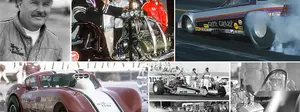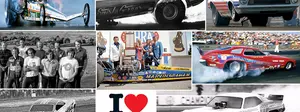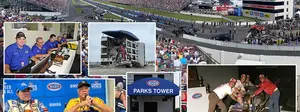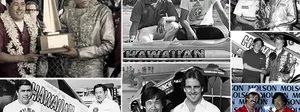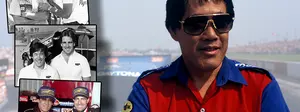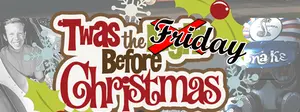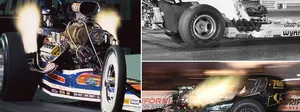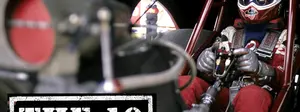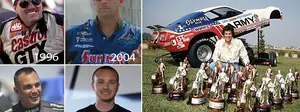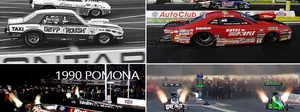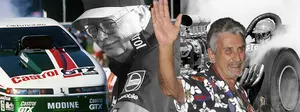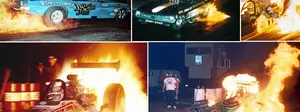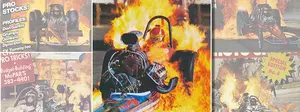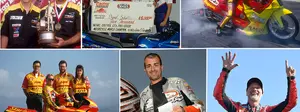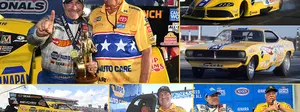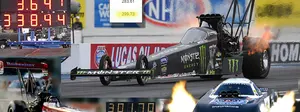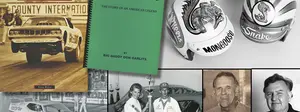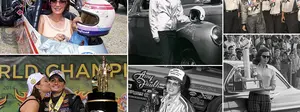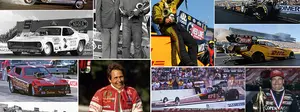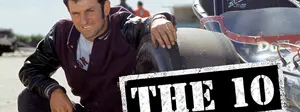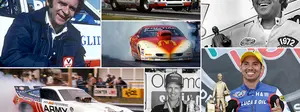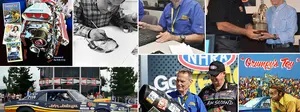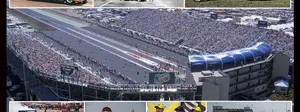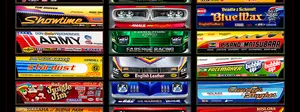“Top Fuel at Indy,” 50 years ago
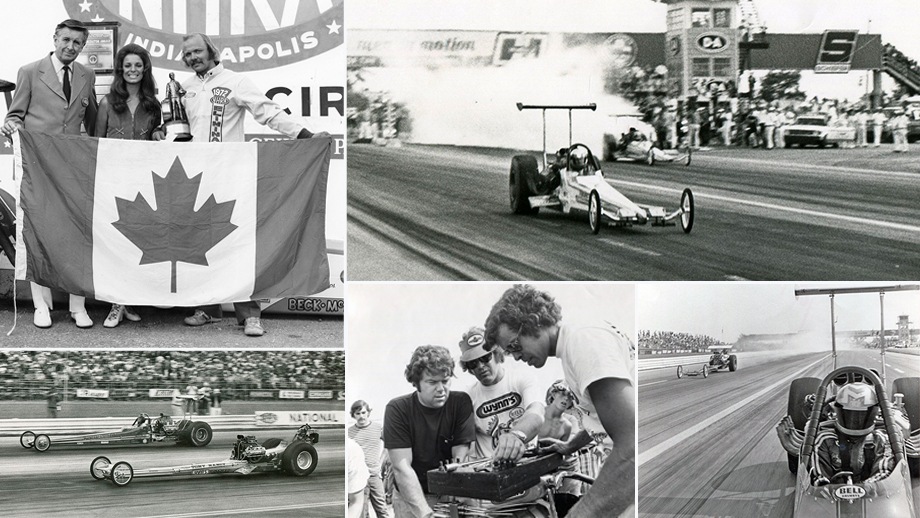

In my first Christmas at National Dragster in 1982, back when the annual NHRA holiday party included a segment where gag gifts were given in a “Secret Santa” way, former ND Editor George Phillips mocked up an album cover for NHRA icon Bernie Partridge, poking good-natured fun at some of Partridge’s occasional announcing malapropisms, mistakes, and musings with song titles like “Check That Thing, Baby” (from Partridge’s way of correcting an error — “Check that. That was Don Garlits, not Don Prudhomme.”). It was very clever, and Partridge loved it, and I remember George getting a kind note that following day from (I believe) Bernie’s wife, P.J., telling George that his gift was “Top Fuel at Indy,” or, in other words, the greatest thing that day.
In our drag racing world, that’s the highest of compliments. I mean, what could be bigger than NHRA’s most recognized class at its biggest and most prestigious event? I’ve always remembered that praise, even if I’ve seldom used it, all of which got me, on the eve of this year’s Big Go, to thinking about (what else?) Top Fuel at Indy. Of course, we don’t know who will win this year, so I thought I’d go back an even 50 years for a photo show and tell from the 1972 U.S. Nationals.
The big takeaway everyone remembers from the 1972 Indy event — regardless of class — was Gary Beck’s Top Fuel win. The former gas dragster driver had taken over the driver’s seat of the Canadian-based McLean, Beck & Lawrence dragster from partner Ken McLean just a few weeks before the Nationals and won in his national event debut.

Now, winning Top Fuel at Indy in your debut is one thing, but what got Beck the real headlines was when he was proclaimed as the first Canadian driver to win a Pro class at an NHRA event. Only problem is, he wasn’t a Canadian, though he certainly didn’t help put that rumor to bed when he proudly held up the Maple Leaf flag in the winner’s circle and for years later never disputed the tale.
Fact is, Beck was born and raised in North Seattle, where he attended Lincoln High School (Class of 1959) with fellow future Northwest nitro great R. Gaines Markley and together joined the Seattle Emperors car club. He moved to Canada in 1969 when he married wife Penny (who was Canadian) and was hired as the driver for an Edmonton-based team, so everyone figured he was Canadian, eh?
"My professional racing career started in Canada with a Canadian racing team, so I can see why people assumed I was Canadian, but I only lived in Edmonton for three years before we moved to California," he told me in a 2008 interview. "But the part about me being a Canadian was all a hoax. I've had that label for many years and still do. I can keep telling people the truth, but it never ends."
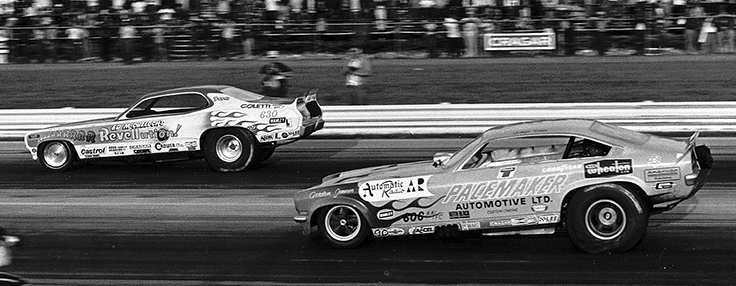
Ironically, another Canadian — a real Canadian — just missed winning in Funny Car, where 19-year-old Gordie Bonin was train-lengthed in the final round by Ed McCulloch. Had Bonin won, he would have claimed that bit of Canadian trivia (because the Funny Car final ran before the Top Fuel final) and, if we do disqualify Beck’s win and all future wins (including Indy the following year) from being the first Canadian Pro winner, guess who ends up as the trivia answer: Bonin, for his win at the 1977 Gatornationals. Funny how things work out …
Top Fuel at Indy in 1972 was still a 32-car field (as it would be through 1980) with the field ranging from Clayton Harris’ polesitting 6.138 to Lou Novelli’s bump-riding 6.738 (six-tenths over 32 cars sounds like a lot). Beck had qualified No. 10 at 6.21.
This being 1972, with the front-engine dragster still a thing (but certainly on its way out), the field was comprised of 22 rear-engined cars and 10 slingshots. The highest-ranked front-engined car belonged to “Gentleman Hank” Johnson in 11th with a 6.359 followed by “the Loner,” Tony Nancy, in 16th; the remaining eight were all qualified in the bottom half of the field.

Of the front-motored crowd, only Nancy won in round one (beating Novelli) to advance to round two, where he was beaten by Herm Petersen (above).
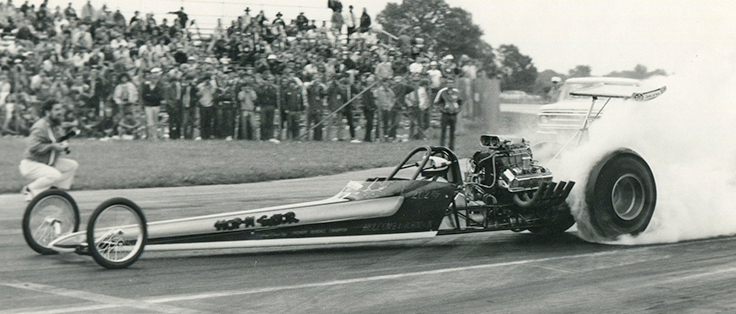
But Johnson, like five of the other qualifiers, couldn’t make the first-round call to face No. 27 qualifier Charlie Moulder (above), who also couldn’t make the call, so two alternates were put in both of their places to race one another, with No. 8 alternate Paul Longenecker beating Ray Stutz, whose newly completed "California Sun" entry apparently was so far down the list of alternates that he’s not even listed on the official qualifying sheet.

Harris, the national record holder (6.15) at the time, was No. 1, but the No. 2 qualifier was a huge surprise in 19-year-old SoCal phenom Randy Allison, who ran 6.196, just a tick ahead of Ruth’s 6.197 — all three ran quicker than Don Garlits’ 6.21 track record set the year before. (Allison also shared Top Speed honors with Harris and Chuck Kurzawa at 234.98, set in qualifying.) That’s Randy, left, with brother Gary. After beating Paul Gommi in round one, Allison red-lighted to Beck in round two.
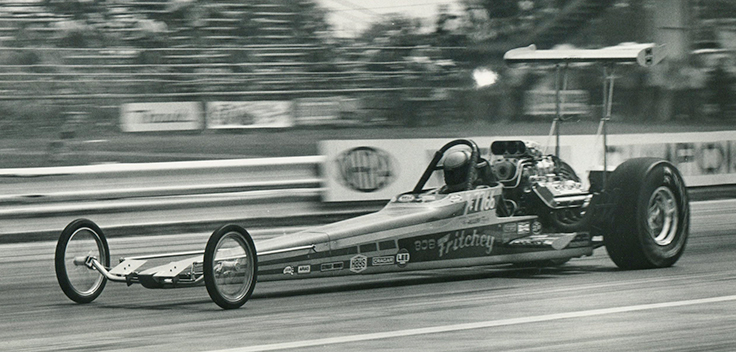
So, if Allison was Beck’s second career victim, who has the honor of being the first of 180 drivers that Beck defeated in his 158-race career? That would be this guy, Bob Fritchey of Urbana, Ill., who surely had no clue that that rookie he raced in round one would go on to win two world championships (and three Indys). According to stats guru Bob Frey, Beck’s 180 round-wins (180-114) still rank him 25th among all Top Fuel drivers, despite the fact that his last competitive ride was 36 years ago (1986, his last year with Larry Minor).
Beck’s other stats: 19 wins (11th most in Top Fuel); 35 No. 1 qualifiers (8th most in Top Fuel); low e.t. 36 times (still sixth most in Top Fuel); Top Speed 17 times (17th most in Top Fuel). Quite a career.
Before we get to the finale, here’s some other fun Top Fuel photos from the event:

So, what does it take one bringing to win to try to win in Top Fuel? A spare engine, a bunch of parts, a few boxes of spark plugs, some quarts of motor oil, assorted hand tools, a tank of compressed air, a box of Mr. Gasket Grip Juice, some fuel jugs, a starter motor, an open-face helmet and breather mask, and, for that rare moment of rest, a mattress. Is this the poor man's pickup bed version of The Garage Photo?

The aforementioned Paul Gommi — a guy who pretty much has done it all in the hot rodding world (remember his Top Fueler that had two blowers on it?) — chatted with eventual runner-up Jerry Ruth, right, before eliminations.

Three of nitro racing’s all-time greats — from left, Ed McCulloch, Tom McEwen, and Don Prudhomme — huddled around “Snake’s” dragster in the pits. While McCulloch — who had already scored three wins and a runner-up in five races so far in the wild 1972 season — went on to win Funny Car for the second straight year (of five total in Funny Car, plus one more in Top Fuel), McEwen and Prudhomme both lost in round three of Top Fuel. According to Don Hirsch, “the Mongoose” and “the Snake” were running in Top Fuel in Indy and had their Funny Cars in Tulsa for the PRO event, which McEwen won.

McEwen, near lane, at the wheel of his Don Garlits-built rail, upset No. 1 qualifier Clayton Harris' New Dimension dragster on a second-round holeshot, 6.30 to 6.26, but lost oil pressure and had to shut off on the line against Carl Olson in the quarterfinals.
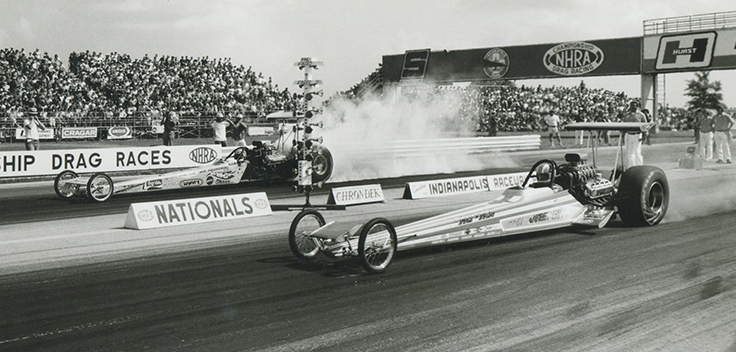
Prudhomme, in his lightweight “Yellow Feather,” smoked the tires against Ruth.
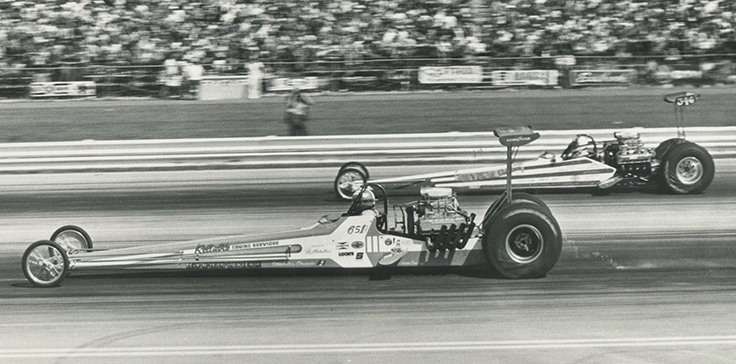
Beck made his best pre-final-round pass in the quarterfinals, running 6.13 to beat Kurzawa and the Bob's Drag Chutes entry. If you look closely, you’ll see something weird behind Beck’s car … what’s going on there?

I ran the photo above a few months ago without noticing the hubbub behind the rear tires, and at least a half-dozen readers wrote to ask me what it is. Was it fluid or something dragging behind the car (the inset pic that I recently added sure looks like something digging into the track)? I didn’t have Beck’s contact handy, so I wrote to Beck’s good pal, Henry Walther, to ask what he knew; turns out he and Beck were already on the case.
“We had quite the discussion about that mystery fluid or whatever it is,” he said. “We had both seen that in your Insider story and had both tried to figure it out on our own, but with no luck.
“The car had a cast-iron block and heads that were filled with water. There was no puke tank as the water drains in the block were AN lines on each side of the block that were routed out through the side panels alongside the engine and capped. That was done so the water could be quickly dumped at the end of the track to start the cooling process before the next run. It is unlikely one of those lines would have come adrift, or even reached behind the car if it did. This car also had a quick-change rear end in it at this time, but there were no lubrication or vent lines used in conjunction with it.
“The other common guess is that it might be the parachute shroud line contacting the track surface. The car had a single parachute, and it was anchored to the top of the rear end, but the mystery trail behind the car appears to be liquid more so than maybe smoke from a shroud line dragging on the track. So that explanation is also unlikely. About all we can say at this point is: 'If someone has the answer, let us know, too.’ “

As you may remember, I’m a huge fan of onboard camera shots [Exhibit A | Exhibit B], and this is another Leslie Lovett beauty, with a camera strapped to the front of Jeb Allen’s Praying Mantis dragster in qualifying, where he's running alongside the winged slingshot of Division 5 kingpin Jere Wilson. Allen qualified No. 13 at 6.37 but got bounced in round two by Carl Olson. Denver-based Wilson ranked 24th after a 6.65 in qualifying but fell to Herm Petersen in round one.
The long-raging battle three-way for Northwest supremacy between Washingtonians Beck, Ruth, and Petersen even carried on in Indy, where Beck and Petersen met in the semifinals, with Beck prevailing, 6.19 to "the Northwest Terror's" tire-hazing 6.46.
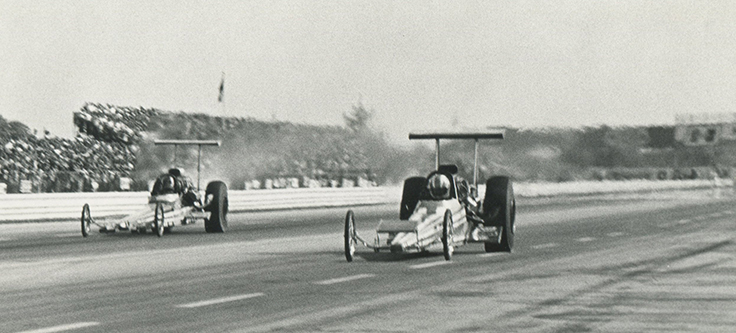
What a cool shot this is! The other half of the semifinals pitted Ruth against Winternationals champ Carl Olson, with Ruth steaming to a 6.11 to 6.46 victory. The combination of Ruth’s win and Petersen’s loss locked up both the Division 6 and Western Conference championships for Ruth. Olson would go a round further the next year, losing in the final round to Beck.
The Top Fuel final pitted “the King” of the Northwest versus the man who would be king. Ruth, who had been racing in Top Fuel since roughly 1963, versus the guy with the ink still wet on his nitro license. (Granted, Beck had years of driving experience in gas dragsters. "I was a 15-year overnight success," Beck told me with a laugh.)

Ruth seemed to hold all of the cards, with runs of 6.06 and 6.07 and many predicting that he was about to lay down the sport’s first five-second pass in the final round. Prior to the final round, the average of all of Ruth’s runs — including qualifying — was a staggering 6.13, two-hundredths quicker than the incoming 6.15 national record that he had just reset to 6.06, while Beck’s best run was, ironically, a 6.13.

Yet, just as happened in the Top Fuel final the year before, when underdog Steve Carbone cagily engaged Don Garlits in a starting-line burndown and emerged the winner when "Big Daddy” smoked the tires, Beck and Ruth had a prolonged staging battle that left both cars “steaming and pouring out torrents of heat waves,” according to the National Dragster report, and when the light turned green, Beck was long gone to his best run of the meet, a 6.11, while Ruth’s Pay ‘n’ Pak dragster went up in hard smoke to an 8.79 loss.
Interestingly, the lead paragraph of ND’s coverage of the event read, “Gary Beck won Top Fuel Eliminator at the Nationals. Gary who???” and you can’t help but chuckle that two years later, the 1974 Indy winner, Top Fuel rookie Marvin Graham, got the same treatment (“Marvin Who?") and still proudly carries the “Who” nickname nearly 50 years later while it never stuck on Beck. Go figure.
As mentioned previously, Beck went on to win Top Fuel at Indy next year, becoming the first U.S. Nationals Top Fuel winner (that’s right: the event name was officially changed from NHRA Nationals to NHRA U.S. Nationals in 1973) and won it again a decade later during a class-punishing 1983 season to become just the third driver in class history to win Top Fuel at Indy three times, behind only Garlits and Prudhomme. (Since that time, Joe Amato, Larry Dixon, and Tony Schumacher have also accomplished the feat.)
So, that’s the story of Top Fuel at Indy, 1972-style. Thanks for taking the ride back with me. I hope this article is “Top Fuel at Indy” of your day.
Phil Burgess can be reached at pburgess@nhra.com
Hundreds of more articles like this can be found in the DRAGSTER INSIDER COLUMN ARCHIVE
Or try the Random Dragster Insider story generator


